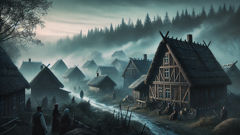Introduction
Finland’s forests have always been places of both beauty and terror. In the hush between ancient spruce, where the moss carpets the roots and the air shimmers with mist, old tales cling to the shadows. These woods, dense and alive, once stretched unbroken for hundreds of miles, sheltering bear and wolf, elk and lynx. But deeper still, beneath the canopy where light rarely falls, older presences dwell—creatures whispered about by the fire, spoken of with dread when the wind howled and the fever took hold. In the centuries when Christianity was still a new arrival and the old gods lingered in the corners of every hut, villagers believed the forest harbored not only wild animals but evil spirits, beings as old as the land itself. Among these, none were more feared than the Ajatar, a spirit whose breath was plague and whose touch was despair.
The Ajatar was no mere ghost. She was said to dwell in the darkest valleys and on the slopes of Mount Syöte, where the fog lay thickest. Some called her the Forest Mother, but there was no comfort in that name. She was serpent and woman, dragon and demon, and wherever she moved, sickness followed. To see her—long green hair matted with mud, eyes burning through the gloom, her body twisting with the grace of a snake—was to feel fever rise in your own veins. In remote villages, the sick would call her name in delirium, blaming her for every cough and chill that threatened to steal breath from a child or elder.
This is the tale of Elina, a healer’s apprentice in the medieval era, who dared to stand between her people and the darkness. When a strange illness swept her village, she was forced to choose: accept the slow defeat of death or face the Ajatar herself, venturing into the heart of the ancient woods armed only with her courage and a handful of sacred runes. In this journey, Elina would discover not only the true nature of the Ajatar but the strength that lives in those who refuse to yield to fear. Through dense pine and endless night, her path would cross with myth and memory, blurring the line between the world of mortals and that of spirits.
The Shadow Over Korvala
The village of Korvala nestled along a curling river where the trees grew thick and ancient, their roots clutching black earth that had never known a plough. Life here was measured by the seasons: the slow green swelling of spring, the long gold days of summer, the crimson hush of autumn, and the endless dark of winter. It was a place where people lived close to the land, and closer still to their fears.

For most of Elina’s seventeen years, the world had been predictable—a rhythm of planting and harvest, healing wounds with herbs gathered by moonlight, and listening to the old women recount tales as embers faded on the hearth. But one spring, the river overflowed its banks, leaving behind a stink of rot and the promise of fever. Soon after, a sickness swept through the village like a bitter wind. It began with chills and coughs, then deepened into something more sinister: skin spotted with sores, eyes gone glassy, limbs trembling in the night. The elders whispered that it was no ordinary illness. Children woke crying from dreams of serpents slithering through the fields, and even the bravest men crossed themselves when dusk fell.
Elina’s mother, Leena, was the village healer. She brewed teas from willow bark, wrapped fevered bodies in linen soaked with spruce resin, and sang old runes that belonged to a time before priests. But nothing slowed the spread. One by one, neighbors fell sick: old Kari, who tended the goats; sweet little Matias, who brought Elina wildflowers; even Leena herself, grown pale and hollow-eyed.
It was in the third week, as despair settled like frost, that Elina heard the first rumor. A woodcutter’s wife claimed she saw a woman in the trees at dawn—hair green as lichen, eyes burning red. Where she passed, the grass yellowed and birds fell dead from the branches. The villagers gathered in the square, voices hushed and urgent. They spoke of Ajatar, the ancient serpent spirit who brought illness to those who angered her or trespassed in her domain. The tales were as old as the stones at the edge of the village. Some said Ajatar was the daughter of Hiisi, lord of evil things, and that she delighted in the misery of humankind.
Elina remembered these stories from her childhood, how her grandmother warned her never to stray too deep into the woods. Now, as she watched her mother’s fever burn, those warnings felt painfully real. Still, Elina clung to her duties, tending the sick, boiling water, fetching firewood for those too weak to move. She found herself repeating her mother’s old incantations, voice trembling as she begged any listening spirit for mercy.
The priest, a gaunt man sent from the distant city, offered little comfort. He scolded the villagers for their superstitions but failed to stop the deaths. At night, when the wind keened through the branches and wolves howled far away, Elina wondered if faith alone was enough. Each morning brought new grief, and the village shrank as one by one, her neighbors slipped into silence.
One evening, as Elina knelt beside her mother’s bed, Leena gripped her hand with surprising strength. Her voice was a raspy whisper: “The answer lies in the forest, child. There is an old magic there—older than any prayer. Find it. Save us.”
With those words, a plan began to form in Elina’s mind. If the Ajatar truly haunted the woods and brought this sickness, then someone must confront her. If no one else would go, Elina would. She gathered what little she could: a pouch of healing herbs, a silver talisman shaped like a bear’s claw, and a scrap of parchment inscribed with runes for protection. At dawn, she slipped from her hut and set out toward the forest’s heart, leaving behind the last warmth of her village for the shadowed silence beneath the pines.
Through the Depths of Pine and Shadow
The forest’s edge was an unspoken boundary. To cross it alone was to enter another world—one ruled by spirits, not men. Elina felt every step echo with dread as she passed beneath the lowering branches. The sun struggled to reach the mossy ground, filtering through layers of green until everything shimmered in half-light. Birdsong faded behind her; in its place came the creak of wood, the snap of twigs, and the endless hush of her own breath.

Elina’s path wound between towering pines, their trunks thick as ancient pillars. She recognized landmarks from childhood adventures: a boulder shaped like a sleeping bear, a stream that sang over blue stones. But these places seemed changed, haunted by the knowledge that something watched her from the gloom. More than once, she glimpsed shapes darting between shadows—a fox with a mangy tail, a crow hopping along a fallen log. Each time, her heart hammered in her chest.
After hours of walking, Elina paused at a clearing where sunlight spilled across a circle of stones. Here, her grandmother once told her, the forest spirits danced on midsummer night. Now, the grass was yellowed and brittle, and a sour smell tainted the air. She crouched to examine the earth, finding small bones and withered flowers—the signs, she knew, of Ajatar’s passage.
She pressed on, following the river upstream. The water ran black and sluggish beneath a tangle of fallen branches. Twice she stumbled and nearly fell into its chill embrace, but each time she righted herself, gripping her talisman and whispering a protective rune. The forest seemed to close in around her, branches tangling above until the path became little more than a tunnel. Here, the air grew thick with mist, and Elina’s breath puffed white in the gloom.
As dusk approached, she found herself at the base of Mount Syöte—a place shunned even by hunters. The mountain loomed above her, its slopes shrouded in perpetual fog. Strange runes had been carved into nearby stones, their meaning lost to all but the oldest villagers. Elina knelt and pressed her palm to the damp earth, recalling her mother’s words: “There is an old magic here.” She chanted the protection rune, voice steady despite her fear.
A sudden rustle made her freeze. Something vast and sinuous moved between the trees. Elina crouched low, clutching her talisman as a figure emerged from the shadows. It was a woman—or so she seemed at first: impossibly tall, her hair a mass of green tendrils tangled with mud and twigs. Her skin was slick and mottled, scales rippling beneath like sunlight on water. Her eyes glowed a fierce red.
“Who comes?” The voice was sibilant, echoing through the mist.
Elina forced herself to stand. “My name is Elina. I seek the spirit called Ajatar. My people are dying.”
Ajatar circled her, moving with a languid grace. Where her body brushed the ground, moss shriveled and flowers wilted. The serpent-woman’s smile revealed needle-sharp teeth. “Your courage is rare among mortals. But courage alone cannot cure the sickness I bring.”
Elina fought to keep her voice steady. “Why do you torment us? What have we done to deserve this?”
Ajatar’s laughter was low and cruel. “You forget the old ways. The forest is not yours to tame. You poison the river with your waste, cut down trees without asking. My sickness is your punishment.”
Despair threatened to overwhelm Elina, but she remembered her mother’s faith in her. “Is there nothing I can offer? No way to appease you?”
Ajatar paused, eyes narrowing. “There is an ancient pact—a balance between your world and mine. Bring me an offering worthy of the old ways: not gold or silver, but life and memory.”
Elina hesitated. “What do you mean?”
“Give me your most precious memory,” Ajatar hissed. “A piece of your soul, freely offered. Only then will I lift the sickness from your village.”
Elina’s thoughts raced: memories of her mother’s embrace, her father’s laughter, the taste of wild strawberries in summer. To lose any of these would be to lose herself. But the faces of the sick rose before her mind’s eye, and she knew what she had to do.
She closed her eyes and whispered, “Take the memory of my first love—the boy who brought me wildflowers.”
Ajatar reached out, her scaled fingers brushing Elina’s brow. Pain lanced through her mind, sharp as winter wind. For a moment, she saw the boy’s face—then it faded, leaving only emptiness where that joy had been. Ajatar drew back, satisfaction gleaming in her eyes.
“It is done,” the serpent-woman said. “Return to your village. The sickness will pass.”
Elina stumbled away, clutching her head as the world spun around her. The forest seemed less hostile now—birdsong returned, and the air lightened as she made her way home.
Conclusion
Elina returned to Korvala in the pale dawn, her limbs weak but her heart still beating. The village had changed overnight—the air was sweeter, and the sick stirred from their beds with new strength. By midday, color had returned to their cheeks. Elina’s mother wept in gratitude, though Elina felt a strange hollowness inside her—she could not remember why wildflowers made her sad, nor whose smile haunted her dreams. Life slowly resumed its rhythm, but Elina moved through it changed, her gaze sometimes distant when the sun set behind the pines.
Word of her journey spread, and villagers spoke of her bravery in hushed tones. Some feared her; others revered her. But Elina spoke little of what she had seen or lost. Instead, she watched the forest’s edge each night, remembering Ajatar’s warning: that the balance between worlds is fragile, and that respect for the old ways must be kept alive if peace was to endure.
Years passed, and Elina grew into the village’s new healer. She taught children the songs and runes of protection, ensuring the stories would not be forgotten. She never again entered Mount Syöte’s misty slopes, but she often left offerings beneath the oldest trees—a handful of berries, a whispered prayer—honoring the pact that had saved her people. In this way, both the village and the forest survived, bound together by memory, sacrifice, and the knowledge that even the darkest legends carry truths worth remembering.













